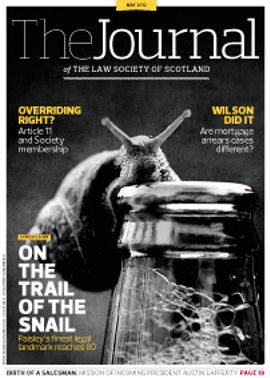Farming the constitution
The Agricultural Holdings (Scotland) Act 2003, s 72(6) provides that, where the limited partner in a partnership which holds an agricultural lease takes action (normally notice of dissolution) to dissolve the partnership, so terminating the tenancy, the general partner can take up the lease in his own right.
In most cases, however, s 73 will then apply, enabling the landlord to terminate the lease in three years’ time.
Exception to the rule
An exception was made in respect of dissolution notices served between 16 September 2002 and 30 June 2003 (s 72(8) and (9)). In such cases, the general partner becomes a protected 1991 Act tenant, unless on the application of the landlord, the Land Court orders that the notice was served otherwise than to deprive the general partner of any right deriving from s 72 and that it is reasonable to make the order. Section 73 is disapplied.
The exception was considered by the Land Court in Salvesen v Riddell (SLC/3/09), which held (on 29 July 2010) that notice of dissolution served by the limited partner on 3 February 2003 had been issued for no other reason than to deprive the general partners of such rights and that, accordingly, they became 1991 Act tenants from its expiry on 28 November 2008.
On 15 March 2012, the Inner House reversed that decision, holding that the Land Court should have allowed the landlord a proof on his assertion that his intention had been to amalgamate the holding with other in-hand farms: [2012] CSIH 26.
Human rights point
Although otiose, the court went on to uphold the landlord’s proposition (introduced at appeal) that s 72(8) and (9) infringed his ECHR property rights (article 1, Protocol 1) and had, accordingly, been outwith the legislative competency of the Scottish Parliament when it enacted the 2003 Act.
The court found that article 1 was engaged on the grounds that, when agricultural land is burdened with a 1991 Act tenancy, the value of the landlords’ interest is materially affected and he is deprived of possession of his land, other than access for inspection. Furthermore, the subsections nullified, retrospectively, the landlords’ contractual rights under the partnership and the lease without compensation, and burdened him with a tenancy which he had limited powers to terminate. Conversely, he incurred contingent liabilities towards the tenant and suffered an immediate capital loss.
The court accepted that the 2003 Act as a whole contained retrospective anti-avoidance measures which could serve a legitimate general interest. But the court found s 72(8) and (9) to be inappropriate as anti-avoidance provisions, because they were both disproportionate and arbitrary especially when compared with the s 73 remedy, available to the landlord where the dissolution notice was served outwith the offending period or, indeed, if the limited partnership came to an end at the end of a contractual period (in which case no notice of dissolution was required and the general partner had nothing against which to claim the tenancy in his own right – as the Land Court decided in Humphrey v Greenlaw (SLC/135/11) on 18 January 2012).
Justification?
The court tried, unsuccessfully, to find a justification for s 72(8) and (9) other than anti-avoidance. It failed to see why a general partner should be protected from the consequences of the dissolution of an existing and lawful contract, freely entered into at arm’s length by two parties experienced in agriculture and in commerce. It considered that the exception had, essentially, been a retaliatory act based on the ministerial view that dissolutions effected in anticipation of what was then future legislation should be struck out. The landlord had acted lawfully at the time the notice was served and would have been unaffected by the proposals for law reform current before the subsections were introduced. There was, accordingly, no reason why the landlord should be penalised for serving notice during the period concerned.
In conclusion, the court allowed the appeal, recalled the order of the Land Court and found that the landlord’s rights under article 1 of Protocol 1 had been violated by s 72. It proposed, therefore, that intimation should be made to the Advocate General and that the appeal should be continued for a hearing on the question of what remedy was appropriate under the Scotland Act 1998 to sever the unlawful provisions. Given the constitutional question overhanging the case, the court decided that it should not return it to the Land Court for further procedure.
The case is obviously of considerable importance. It is the first in which the Court of Session has found a provision in a statute of the Scottish Parliament to be unconstitutional.
For that reason, the Lord Advocate was, on 29 March 2012, granted leave to appeal to the Supreme Court. The appeal has now been lodged and we await further developments with interest.
In this issue
- Arguments in store
- Farming the constitution
- Willing to wound, yet afraid to strike?
- Deferred consideration – worth the paper?
- OSCR: the secondees' perspective
- To efficiency and beyond
- Reading for pleasure
- Opinion column: Fraser Tait
- Council profile
- Book reviews
- President's column
- Wind farms: a challenge to registration
- Snail of the century
- Rights both ways
- Sell, sell, sell
- RBS v Wilson: light in the tunnel?
- Take the heat out
- Prepare for case management
- Looking into the past
- Migrant days numbered
- CPI - the story so far
- Brighton declares
- Mary Mary quite contrary?
- How to avoid that Guarantee Fund interview, and worse...
- Law reform roundup
- Apportionment of price for SDLT
- Business checklist
- Practical guide to legal risks
- Ask Ash






